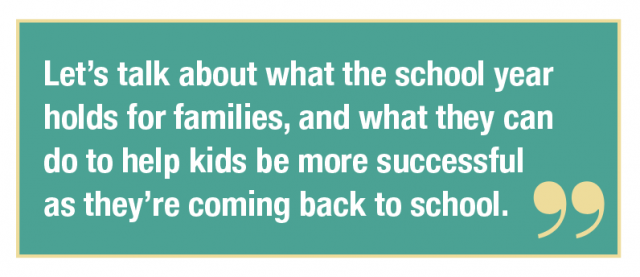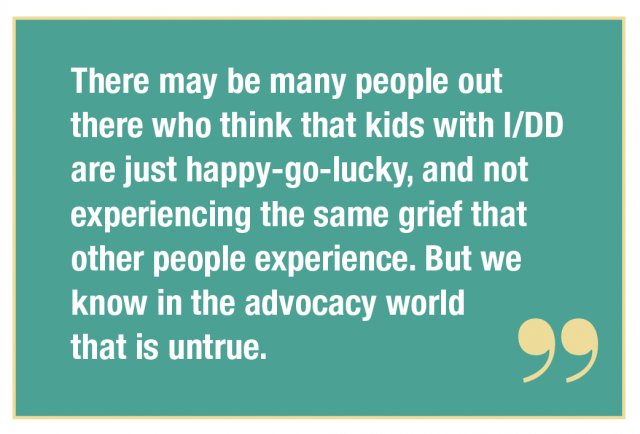For students with intellectual/developmental disabilities (I/DD), I don’t think we’ll be able to find many students that haven’t typically had some negative impact around their education for the past two years during the COVID-19 disruptions.
For many students, especially if they’re immunocompromised, not yet vaccinated, or they’re not going to be vaccinated for whatever reason, they have not been in school at all for almost a year and a half. That means kids that started first grade in March 2020 will be going back to school this fall in third grade, and those are really different grades.
So, we have a lot of students who number one, missed academic instruction; and number two, missed social and learning opportunities through being a student in our schools. Number three, kids have been home with their parents a lot, and they’re probably very strongly attached to being at home. And that’s also going to be an interesting transition.
So, as we go into Fall 2021, kids with I/DD are probably going to fall into three different groups – the first would be kids that have not had in-person and face-to-face learning since March 2020. The second would be kids who went back in some fashion, probably early fall or mid-winter. And they probably had a lesser level of services, but they have been to school face-to-face. They would be returning this fall to a typical school day and a typical week.
Then the third group is kids that are likely still immunocompromised. They are not yet vaccinated, have had heart surgery in the past year, or live with extra vulnerabilities. And COVID-19 has had a disproportional health impact on them. So, some children will not be returning face-to-face in the fall, and they will probably still be seeking a virtual program.

Let’s talk about what the school year holds for families, and what they can do to help kids be more successful as they’re coming back to school.
All schools are going to have pre-planning for teachers for a week or more even before school starts. So arrange for your child to go meet their teacher. Go see the space, especially if your kid is transitioning from elementary to middle, or middle to high school, or you’ve moved and they’re in a totally different school.
Get them physically into the space and feeling a little more comfortable. Get them back on a schedule. Get them used to getting up in the morning. Do some small academic tasks at home. If you have the means, put your child in a day camp, or do some summer activities to get them used how the day moves from one activity to the next. Those are good opportunities.
Communicate clearly with the school what your child may have been missing and set up a meeting right before school starts. The teachers need to know where your student is, and where they should be if there had not been a global pandemic.
One of the major questions in the field of education is what is Fall 2021 going to look like? Is it going be different in light of the COVID-19 disruptions? I want to tell you that one of my biggest fears is that it’s not. And I think we have to remember that students and educators and parents have been through a collective trauma – and everybody is going to come back to school different than they left.
There’s a lot of conversation about loss of academics. We also have to remember that people have had a really hard time beyond even the pandemic. There have been major issues in America around economics; 600,000 people have lost their lives; and there have been major racial disruptions, tensions and protests.
Most of us will look back on this year as a pivotal year, and we will bring all of that with us to school. So, we must remind ourselves to be patient. If you’re an adult who just took a year and a half off working remotely, and now you are going back in person – think about the things you are worrying about.
Students and teachers will have these same fears. For kids that have been in school that are now returning, it may be weird to be in school without a mask or dividers. Another piece that’s going be different is that both state and federal guidance is not very clear around if masks are required for kids who are unvaccinated, or if there are partitions, or if classes are going be smaller. We really just don’t know. You should familiarize yourself with your local school board, so you can communicate with them about your kids.
One of the situations that is going be challenging is kids who’ve been home for the past year and a half. For parents, we’re used to knowing exactly what our kid ate and how they slept last night. What happens during their school day? Will we be having a lot of separation from our kids?
You might not always know what’s happening in the school day. Even though we didn’t always know before, we were used to it. And now we’re not. We’re expecting to see a fair amount of separation anxiety for lots of kids – and probably lots of parents. We’re really all used to being together. It’s going require a lot of courage for kids to get on that bus, even though they’re excited to go back to school.
The anxiety of living through a pandemic hasn’t left us, even if we’re entering a new post-quarantine stage, because we are not post-COVID. That is going to be really challenging. There will be a lot of new teachers. Many teachers did not enjoy the experience of distance teaching and some said, I’m not willing to go back in the classroom.
It’s going take students some time to learn their way around the building, to figure out how to really re-interact with peers and teachers again. How do you work a locker? What does it look like to change for PE? Ride the school bus?
First, focus on being in the role of a student, making sure that they feel safe physically and emotionally in school. That is the prerequisite for academic instruction. Making sure kids understand behavioral expectations, health and safety expectations, the school day, the physical layout and then academic expectations.
Coming into the school year, if your student currently has an Individualized Education Program (IEP) and is eligible for special education-related services, use that to help you understand where your student is academically, where they should be, and what you can plan and hope for this year.
I encourage you to request an IEP meeting during a time like pre-planning, because it gives the school information about your student. If your kid has been in school, there’s information from the year before. If your kid’s been home, the parent has the information about the kid’s educational progress. So, pre-planning can set the stage for success. Wait two or three weeks after school starts and the teacher knows your kid. That means the teacher will say, “I’ve seen your kid struggling with this, and really strong at that. I think we should focus on this for your kid,” and they’ll have a lot of that information.
So, definitely make sure you have something on the books. Teachers are going to be understandably busy, and every kid is going to need an IEP meeting. The teacher may say, “We did one at the end of last year.” Well maybe, but summer regression’s always an issue for students with I/DD.
You really need to push for this if you want to understand academically where your student is in reading, in math, in writing. Take a look at those scores for the first month of the school year. Then take a look at the scores the last time your kid was in school. If they had really good virtual schooling and got good benchmarks, see what type of progress your student is making. If they haven’t made academic progress in the past year, ask for something called compensatory services for the services your student has missed.
You can also ask for physical therapy, occupational therapy and speech therapy. If your student has missed therapy during the past year and a half, whether in-person or virtual, it does not matter. Ask for compensatory education. It’s good for your student. It’s actually really good for the teachers for students to have more individual attention so they can bring their class to where it needs to be. That is the way the law is supposed to work. It doesn’t mean that the school did anything wrong. But it does mean students have a legal right to services, and schools have the opportunity provide them.
A lot of kids have experienced trauma and major disruptions in their lives. Pay attention to your kid’s psychological and emotional needs. Request services from the school to support social and emotional growth.

There may be many people out there who think that kids with I/DD are just happy-go-lucky, and not experiencing the same grief that other people experience. But we know in the advocacy world that is untrue. People have all of the same emotional breadth and deserve the same supports, if not more during this time.
So, I also encourage all of us to look at what’s happened, not just within the school or academically, but also holistically for kids during this year.
VIDEO INTERVIEW: Watch the captioned presentation by Attorney Leslie Lipson
[aiovg_video id=3100]
